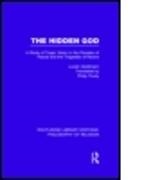Read more
The concept of 'world visions', first elaborated in the early work of Georg Lukacs, is used here as a tool whereby the similarities between Pascal's Pensees and Kant's critical philosophy are contrasted with the rationalism of Descartes and the empiricism of Hume. For Lucien Goldmann, a leading exponent of the most fruitful method of applying Marxist ideas to literary and philosophical problems, the 'tragic vision' marked an important phase in the development of European thought from rationalism and empiricism to the dialectical philosophy of Hegel, Marx and Lukacs. The book is not a collection of isolated essays on Kant, Pascal, Racine, the status of the legal nobility in seventeenth-century France and the exact nature of the religious movement known as Jansenism, but an attempt to formulate, by an examination of these different topics, a general approach to the problems of philosophy, of literary criticism, and of the relationship between thought and action in human society.
List of contents
Preface Part 1: The Tragic Vision 1. The Whole and the Parts 2. The Tragic Vision: God 3. The Tragic Vision: The World 4. The Tragic Vision: Man Part 2: The Social and Intellectual Basis of the Tragic Vision in Seventeenth-Century France 5. World Visions and Social Classes 6. Jansenism and the noblesse de robe 7. Jansenism and the Tragic Vision Part 3: Pascal 8. The Man. The Meaning of His Life 9. Paradox and Fragment 10. Man and the Human Condition 11. Living Beings and Space 12. Epistemology 13. Ethics and Aesthetics 14. Social Life: Justice, Power and Wealth 15. The Wager 16. The Christian Religion Part 4: Racine 17. Tragic Vision in Racine’s Theatre – The Tragedies of Refusal, The Dramas of This World, Tragedies with Peripeteia and Recognition, The Sacred Dramas. Appendices
Summary
The concept of ‘world visions’, first elaborated in the early work of Georg Lukàcs, is used here as a tool whereby the similarities between Pascal’s Pensées and Kant’s critical philosophy are contrasted with the rationalism of Descartes and the empiricism of Hume. For Lucien Goldmann, a leading exponent of the most fruitful method of applying Marxist ideas to literary and philosophical problems, the ‘tragic vision’marked an important phase in the development of European thought from rationalism and empiricism to the dialectical philosophy of Hegel, Marx and Lukàcs.The book is not a collection of isolated essays on Kant, Pascal, Racine, the status of the legal nobility in seventeenth-century France and the exact nature of the religious movement known as Jansenism, but an attempt to formulate, by an examination of these different topics, a general approach to the problems of philosophy, of literary criticism, and of the relationship between thought and action in human society.

